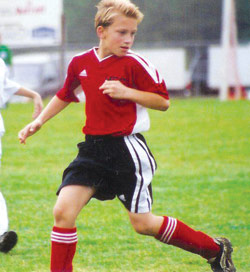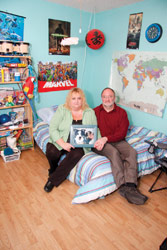Editor's note: Juvenile court is a hard place: hard benches, hard stories, hard decisions that must be made. Children may be torn from families — or saved from them — by judges, social workers and lawyers who must navigate complex social vectors to arrive at solutions that are often less than ideal.

Over the past nine months, Mountain Xpress has attended a dozen court sessions on the eighth floor of the Buncombe County Courthouse, following a complex child-custody case brought by the Buncombe Department of Social Services against a local family. The following account outlines their experience. A subsequent article will explore the court case and its background in greater detail.
Ryan Baldwin made it home for the holidays. The 17-year-old returned to his family's modest ranch house in Black Mountain — reuniting with his parents, his dog and his room, with its 35-gallon aquarium, computer and video games, and shelves full of manga volumes— just before Thanksgiving. But he's home only on a trial basis granted by the court; at this writing, the DSS retains official custody.
As he left the courtroom following the November decision that allowed him to go home, the young man in the wheelchair reached out and grabbed his grandfather's arm. Dino and Trini Frattaroli — or Poppy and Nanny, as Ryan calls them — had been present at every court session since last April, waiting in the hallway alongside Ryan's parents and then maintaining a silent vigil inside throughout the hours and days of testimony.
"As long as we're at [Poppy's] house, it will be a real Thanksgiving," Ryan said as his parents, grandparents and several well-wishers clustered around him outside the courtroom door.
During the past year, Ryan lived in four different temporary placements while his life was being examined and cross-examined before a juvenile-court judge. His parents, Lisa and Rodney Baldwin, had been charged with medical neglect, based on a complaint to DSS from a source whose identity could not be revealed to the family. And for nearly five months following their son's removal from their home, they were not allowed to visit or speak with him. Ryan's only contact with his family was the two phone calls Poppy was allowed each week, with the foster parent listening in on a speakerphone.

Ryan had been diagnosed with CFIDS (chronic fatigue and immune dysfunction syndrome) in 2004 and again at a different clinic in 2005 (see box, "Puzzling Ailments"), and the Social Security Administration declared him legally disabled in 2006.
As court testimony repeatedly indicated, the key evidence cited in support of the medical-neglect charge was the boy's lack of a primary-care physician. It was also alleged that the family had failed to follow through on their only child's health issues.
In January 2009, DSS had asked that both mother and child receive mental health evaluations, specifically recommending that the mother be evaluated by someone with experience in diagnosing Münchausen syndrome by proxy, a little-known, controversial condition that's also called factitious disorder by proxy (see box). Although there is considerable disagreement among medical professionals concerning this disorder, some sources maintain that in such cases, it may be necessary to separate the victim — typically a young child — from the caregiver for the victim's protection.
Unexplained symptoms
Born in July 1992 with no apparent complications, Ryan had grown into an adorable blond toddler and, later, a young soccer star, as chronicled by the photos adorning the walls of his parents' and grandparents' homes. His mother, who holds a degree in social work from Mars Hill College, started a dog-sitting business so she could stay home with her son. Ryan's father has worked for years as a technician in the auto industry.
Their son progressed more or less normally until age 9, when he developed a movement disorder that produced various tics and other symptoms that became chronic. The parents believe a reaction to a drug prescribed for a stomach ailment may have precipitated the problems, but whatever the cause, the symptoms persisted.
Over the next few years, other chronic symptoms emerged — more stomach pains, a worsening of allergies, severe sinus infections, fierce headaches, temporary memory loss, slurring of words and general fatigue.
The child's medical record swelled as the parents ferried him to various specialists and clinics, seeking answers and effective treatment for the latest symptoms. But by 2003, the 11-year-old's physical stamina had deteriorated so much that all-day schooling was becoming impossible, and his pediatrician recommended home-based instruction for the boy.
Before Ryan's health seriously declined, his parents and grandparents remember him as a kid who would "do everything" — an avid chess player and an active roller skater, basketball player, skateboarder. But after that, Poppy recalls, things went steadily downhill until "Half the time … he couldn't get out of bed."
In place of school, which Ryan had loved and where he'd excelled academically, a visiting teacher now came to his home for a few hours a week. And over time, even those visits became shorter and less frequent. At that point, the parents opted for home schooling, and Nanny and Poppy helped out with the $1,500-a-year bill for the Keystone series of workbooks and online courses. The grandparents also helped pay for visits to specialists at such faraway facilities as the Mayo Clinic in Rochester, Minn. — trips made more expensive because car travel exacerbated Ryan's fatigue, necessitating frequent stops and overnight stays.
A family affair
Over time, this difficult situation has taken its toll on the whole family. Asked about the effect on the boy's mother, Poppy says: "I think it's mostly the stress of [the custody case]. It's finally starting to affect her in a way that she's getting in bad shape, where all her joints ache.

"It's had stress on me," he adds, describing his emergency trip to the hospital on Easter morning with strokelike symptoms that turned out to be signs of a complex migraine.
"That's how it's affected me. She's getting all kinds of pains, too, now," he says about Nanny. "It hasn't been easy, I can tell you. And it's been a year now."
Ironically, Poppy and Nanny were the first people to provide a home for Ryan when he was taken from his parents. After less than two weeks, however, the boy was moved to the first in a series of licensed foster homes.
Poppy remembers when he first observed the onset of his grandson's serious deterioration. "Ryan was playing soccer, and for some reason he looked really tired — couldn't run as fast, he was breathing really hard — and every once in a while he'd stop and look up at the sun. And I said to Lisa, 'What's wrong with Ryan? How come he's acting like that?' And she said, 'I don't know.' … And that was the start of it."
According to Lisa's extensive records, Ryan eventually began experiencing intense chest and neck pain, blood pressure variations and a periodic inability to sit or walk. And in 2004, the boy's pediatrician had suggested chronic fatigue syndrome as a possible explanation for this puzzling cluster of physical distresses. A specialist in Chapel Hill produced a diagnosis of pain disorder and CFIDS — chronic fatigue and immune dysfunction syndrome, confirmed a year later at another clinic.
Meanwhile, merely controlling the symptoms remained a seemingly insurmountable hurdle. A wheelchair helped the boy get around, but by 2006, the Social Security Administration had declared him disabled.
A whole new world
Ryan's parents now found themselves plunged into a new world of awareness and advocacy on behalf of both the boy and his diagnosis. His mother,in particular, was not afraid to challenge medical professionals concerning her son's problems and the appropriate treatment. "There is such ignorance in North Carolina regarding this illness," she laments. "But what I found out is, it is everywhere."
In the midst of these struggles, the woman who'd been Ryan's pediatrician for the past five years abruptly terminated her services. The parents say they tried without success to find a new doctor for their son, asking numerous offices and medical associations — including the DSS itself — for help.
Then, on Dec. 7, 2007, a DSS social worker visited the Baldwins' house and informed Lisa that a medical-neglect complaint had been lodged against them and that a "family safety assessment" was being initiated.
Over most of the next year, a social worker visited the family nearly every week. And in early January of 2009, in a recorded voice message, their social worker told the family that the case was being closed and asked them to come to the DSS office to sign the paperwork. Instead, however, when the parents arrived, they were served with subpoenas to appear in court.
Thus began a protracted legal battle that has yet to end. The family is due to return to court in January, and after that hearing, Xpress will report in more detail on the medical, legal and governmental aspects of the case.
In the meantime, Ryan remains at home with his parents and his dog, Snickers (who is deaf and responds to sign language), enjoying video-game time with his best friend.
"You just don't know how good it is having that kid home," his mom says, ticking off Ryan's Christmas presents this year: a Sony PSP (from his grandparents), dartboard, foosball table and video games. Then there were the two books Mom ordered for him. Ryan's response, she recalls with a laugh, was "You're not allowed to talk to me about world literature until the fourth of January."
Freelance reporter Nelda Holder can be reached at nfholder@gmail.com.



“In January 2009, DSS had asked that both mother and child receive mental health evaluations, specifically recommending that the mother be evaluated by someone with experience in diagnosing Münchausen syndrome by proxy, a little-known, controversial condition that’s also called factitious disorder by proxy (see box). Although there is considerable disagreement among medical professionals concerning this disorder, some sources maintain that in such cases, it may be necessary to separate the victim — typically a young child — from the caregiver for the victim’s protection.”
What were the results of the psych. evaluations? Has lack of a primary care physician become a reason to snatch a child from it’s parents? What about folks who are in transition? Can they lose their child due to not having a primary care physician? Something is screwy here.
Why did the pediatrician terminate services, and did the DSS have access to those records?
Thanks for covering this story. In recent months, CFIDS has become much less mysterious, with a paper published 10/8 in the top journal Science reporting an association between CFIDS and the newly-discovered retrovirus XMRV. It was covered on the Dr Oz show:
http://www.youtube.com/watch?v=_WEUC7hRXzM
It’s a shame that poorly-understood diseases are treated as psychological until the cause is discovered – the same thing used to happen with MS.
Paul — Good questions. And the answers are illusive, but we’re working on it.
I was diagnosed with CFIDS in 1992 at the age of 13 and clearly remember how lonely it was. I was heart broken to hear that this young man had to be uprooted and put through so much change while fighting this illness. It’s hard enough to deal with such a widely misunderstood illness where you are often labeled depressed, school phobic, a troublemaker, lazy, or insane. I was a highly active gymnast, dancer, swimmer, and all around high energy kid who could no longer climb the stairs, hold my head up straight, or function at a normal level.
There are not any standard treatments for CFIDS and most doctors are not knowledgeable enough to know how to handle it’s vague nature and ever changing symptoms. Finding appropriate healthcare for something like this seems impossible sometimes, so why should this child and family be punished for it?
Ignorance tends to breed paranoia but where do we draw the line?
More here:
http://randomasheville.blogspot.com/2010/01/nelda-holder-part-i-in-mountain-express.html
Could there possibly be much more to this story
than “medical ignorance” ? Maybe the issues of
“Conspiracy” and “Public Corruption” are very
much intermingled here !
There may be something to justice watcher’s
comment ! I have heard that Buncombe County
NC is the most publically corrupt in the state.
I just wanted to say how happy I am that Ryan is finally home. As a CFS patient myself, I know all too well how horrible it is to deal with this illness, and how much the support of family means. Having that cut off is beyond cruel.
I also know that many of us with CFS react very poorly to most meds, and I saw in another article that refusing to make Ryan take some meds was one of the reasons that allegations were made. No one should ever be pressured into taking any med, let alone such a strong one and one which he/she cannot tolerate. That makes me almost as furious as the the rest of this story does. (So much of what took place was abusive, and not by the family, but by those charged with protecting the innocent. Some of it may have been well intentioned, but it is still unacceptable.)
I have kept Ryan and his family in my prayers all along and I now pray that he is allowed to remain home, and that all that happened does not worsen his illness.
My heart and thoughts are with you..Buncombe county dss is the most currupt most useless bunch of liars…Unbelieveable..Why are they not going after really people with real problems who dont deserve there kids.Who gave them this much power and control???Its troubleing…..